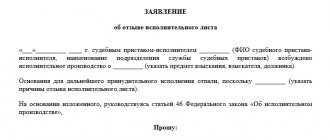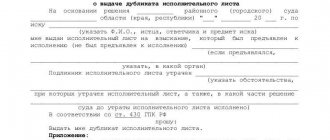Resumption of enforcement proceedings after its completion is possible provided that such a decision is canceled and there is a deadline for presenting the enforcement document for execution. The resolution on the completion of enforcement proceedings (IP) can be canceled by the senior bailiff (head of the OSB) either on his own initiative or on the basis of a received application from the claimant. The reason for this is that you need to repeat some enforcement actions and apply enforcement measures.
Thus, in order for the claimant to resume enforcement proceedings after its completion, a set of conditions is necessary:
- The deadline for presenting the writ of execution for execution, established by Art. 21 of the Law on Enforcement Proceedings (hereinafter referred to as the Law).
- Continuation of enforcement proceedings is required to carry out enforcement actions and apply appropriate coercive measures, including repeated ones.
- The claimant prepared and sent to the bailiff an application to cancel the decision to terminate the individual entrepreneur.
Resumption of enforcement proceedings on alimony: step-by-step instructions
Enforcement proceedings can be resumed at the request of the claimant. You can contact the bailiffs during the validity period of the writ of execution. An executive document is a notarial agreement, a court order or a writ of execution.
The executive document is valid:
- until the child reaches adulthood - if alimony is collected for a minor child;
- 3 years – if alimony is collected from an adult relative, spouse or former spouse.
You can resume enforcement proceedings in 2021 in the following ways:
- File a complaint against the actions or inaction of the bailiff. It is used if proceedings are terminated, suspended or terminated without reason. The complaint must be filed with the court or the head of the FSSP.
- Send an application to the bailiff. This method is used if the claimant himself took the writ of execution.
Through the fault of the bailiff
The bailiff may suspend enforcement proceedings for alimony if he cannot find the debtor. Sometimes such a decision is made, although the bailiff did not try to find it.
In this case it is necessary:
- File a complaint against the bailiff. It sets out the reasons why the proceedings should not have been terminated and the requirement for resumption.
- Send a complaint to the senior bailiff. It can be submitted via e-mail, personal account on the FSSP website or during a personal visit on the reception day.
- Wait for an answer. If the head of the FSSP department believes that the bailiff suspended the proceedings legally, then you need to file a complaint about the inaction of the head. It is sent to the regional FSSP department or to the prosecutor's office.
At the initiative of the claimant
If enforcement proceedings have been suspended, completed or terminated legally, then they can also be resumed.
To do this, the claimant or debtor must:
- Find reasons for renewal.
- Submit a statement to the bailiff.
- Obtain a resolution to resume enforcement proceedings.
Within 10 days from the date of receipt of the application, the bailiff must review the documents and make a decision. If there are sufficient reasons to resume proceedings, then the bailiff must issue a ruling and send it to the debtor and the collector.
If there are no grounds for renewal, then he must refuse to satisfy the requirements.
Expiration of the statute of limitations for a writ of execution
The period for collection during enforcement proceedings is established by clause 1 of Art. 36 Federal Law No. 229. It says that the requirements under the writ of execution must be fulfilled within two months. Based on this, unscrupulous debtors conclude that it is enough to evade fulfillment of their duties at this time, not show themselves to the bailiff, and he will be forced to complete the proceedings, and the debt will not be subject to collection. This is wrong.
In reality, a debt collected in court may remain pending for an indefinite period of time. Even in the case when the proceedings are officially completed, for example, due to the impossibility of collecting the property, the claimant can present the writ of execution again. Then the collection will continue again. And this can happen many times during the life of the debtor. For many, illegal actions, expressed in evading debt payments and fleeing from bailiffs, are the way out. But why use dubious “gray” methods when you can file for official bankruptcy?
How to make an application for renewal of an individual entrepreneur?
There is no official application form. But the document must contain the following information:
- name of the FSSP, full name of the bailiff;
- Full name and residential address of the debtor and the claimant;
- number and date of execution of the resolution to initiate IP;
- information about the resolution on the termination, suspension or termination of the individual entrepreneur;
- grounds for the procedural actions of the bailiff, carried out by him earlier: revocation of ID by the collector, stay of the debtor in the army;
- requirement for renewal of IP.
The application is filled out on a prepared form in black or blue ink. Do not use pencils, felt-tip pens or colored pens.
Suspension, termination and termination of enforcement proceedings on alimony
Collection of alimony debt after 18 years: procedure and deadlines
Statement
The restoration of the deadline for presenting a writ of execution for execution and the resumption of proceedings in the case are carried out on the basis of a petition. The document is submitted to the court that made the decision in this case. It states the following:
- The name of the court without abbreviations with the exact address.
- Applicant's details with full name, place of residence, telephone number.
- Information about the debtor.
- The title of the document in the central part of the sheet in large letters.
- Number of the writ of execution, information about the decision, its essence.
- Production number according to the document.
- Information about the determination of suspension.
- An indication that the reasons and circumstances preventing debt collection have been eliminated.
- Link to legislation on enforcement proceedings, Code of Civil Procedure of the Russian Federation.
- The word “please” is in the center of the page.
- Request to consider the issue of resuming proceedings by executive order (specify the number).
- List of attachments (photocopy of the writ of execution, resolution on the commencement and suspension of the process, documents confirming the reason for the repeated procedure, copy of the petition).
- Date and signature.
Payment of the performance fee
After the initiation of enforcement proceedings, the debtor receives 5 days to voluntarily pay the debt. If he does not pay the debt, then an enforcement fee is collected from him.
The enforcement fee is 7% of the debt amount, which is withheld in favor of the state. If enforcement proceedings are terminated or completed, the debtor is still required to pay the fee.
In 2021, they can only be released from payment by a court decision if the debtor proves that the debt was accrued unlawfully.
Legislative reasons for suspension and termination of individual entrepreneurs
The procedure is regulated by the federal law on enforcement proceedings, the norms of the Code of Civil Procedure and the Arbitration Procedure Code of the Russian Federation. Upon suspension, all actions are suspended temporarily until the circumstances that impede debt collection are eliminated.
The case is subject to temporary termination by court decision in the following cases:
- The debtor or plaintiff disagrees with the valuation of the property.
- The claimant objects to the resolution on the appointment of an enforcement fee.
- Cancellation of the seizure of assets that are subject to seizure.
- The parties are challenging the court decision on which the writ of execution was issued.
- Objections to the act of an administrative offense.
- Challenging the actions or inaction of the executor, a decision made during the consideration of the case.
- Appeal requesting clarification of provisions from the executive documentation.
- The defendant is on a business trip for a long time.
Legal consequences
The main consequences of filing an application for the resumption of enforcement proceedings:
- The bailiff sends out orders to resume proceedings.
- The bailiff is looking for the debtor's property and bank accounts.
- The bailiff holds the debtor accountable: he restricts the right to drive a car, imposes a ban on traveling outside the country (if the debt is more than 10,000 rubles).
- The bailiff seizes the debtor's property for sale at auction to pay off the debt (if the value of the property is approximately equal to the amount of the debt).
If the amount of the debt is too large, the debtor can ask the court for an installment plan and transfer money monthly in amounts convenient for him.
Return of the writ of execution
The document may be returned to the claimant in the following cases:
- At the request of the claimant;
- When it is not possible to execute the specified document obliging the debtor to perform specific actions or, conversely, obliging the debtor to refuse to perform them, but the opportunity to do so remains;
- When it is impossible to establish the whereabouts of the debtor, the property belonging to him or to obtain information about the presence of his valuables, funds in accounts in banks and other organizations;
- If the debtor does not have property, and this is confirmed by unsuccessful attempts by the bailiff to find this property;
- When the claimant himself refused to keep the debtor’s property, which could not be forcibly sold;
- When the claimant himself, by his actions, prevents the necessary actions from being performed;
- When a debtor who has not paid a fine for an administrative offense is a foreigner or stateless person and is officially expelled from the Russian Federation.
An interesting option for debtors may be to return the writ of execution to the claimant due to the impossibility of collection or lack of property. If a citizen’s debt is from 50,000 to 500,000 rubles, this gives him the right to apply to the multifunctional office with an application to declare him bankrupt in a simplified manner. You won’t have to pay any expenses (even state duty is not provided). Neither the court nor the financial manager is involved in the process of such bankruptcy. If the debtor’s situation does not change and creditors do not suspect him of concealing property and do not make other claims, the debts will be written off after six months.
Grounds for termination, completion and resumption of enforcement proceedings
Enforcement proceedings can be:
- discontinued;
- finished;
- suspended.
These are procedures carried out by the bailiff. Let's look at why they are needed, what is their difference and what they are used for.
To terminate
Termination of enforcement proceedings is carried out if the grounds for collecting alimony have ceased (Article 43 of the Federal Law of 2007 No. 229). It does not matter whether the payer fulfilled his obligation or not.
Grounds for termination:
- The child has turned 18 years old. This is the only situation where proceedings are terminated automatically, without the debtor’s application. In other cases, you need to bring a confirmation document to the bailiff and write a statement.
- The child is emancipated. Emancipation is the acquisition of full legal capacity by a child between the ages of 16 and 18. This is possible if the child works under an employment contract, carries out entrepreneurial activities, or is married. Emancipation is possible with the consent of the parents - by decision of the district administration, and without the consent of the parents - by a court decision.
- The child is adopted.
- The payer challenged paternity in court.
- Death of a child or father (or other beneficiary or payer). If the mother dies, this does not relieve the father from child support obligations. If the father does not take the child with him, then he must continue to pay child support. If a child is placed in an orphanage, then funds must be transferred to his bank account. He will be able to use them after the age of 18. If the child is placed under guardianship, then alimony is transferred to the guardian’s account.
- The ex-wife got married.
- The adult relative for whom alimony was paid did not confirm his disability.
- An adult relative found a job or received other additional income.
To finish
The end of enforcement proceedings on alimony is possible in the following cases (Article 47 of the Federal Law of 2007 No. 229):
- The writ of execution has been submitted to the accounting department of the employing enterprise. In this case, the accountant, not the bailiff, is responsible for the monthly receipt of alimony.
- The recipient voluntarily refused alimony and took the writ of execution.
- The debtor moved to another city. Documents for collection are transferred to the FSSP department at his new place of residence.
- The debtor moved to another country. In this case, it is impossible to collect alimony according to the writ of execution.
To suspend
Suspension of enforcement proceedings is the suspension of collection for a certain period (Article 40 of the Federal Law of 2007 No. 229). When the period ends, collection is resumed in full.
Enforcement proceedings are suspended if the debtor:
- sent on a long business trip to another country;
- called up for compulsory military service;
- called up to participate in hostilities;
- declared incompetent;
- undergoes long-term treatment in a hospital (tuberculosis, oncology).
The bailiff issues a suspension order and sends it to the recipient and the debtor. The document indicates the period for which production is suspended.
Liquidation or bankruptcy of the debtor
Enforcement proceedings are subject to termination, including in the event of liquidation of an enterprise, and in the event of official bankruptcy of an individual. If we are not talking about the simplified procedure mentioned above, the latter takes place in court with the participation of a financial manager. Judicial bankruptcy of an individual is a complex multi-stage procedure, which is best carried out with the reliable support of experienced lawyers.
To effect bankruptcy, an individual must be a citizen of the Russian Federation, his debt must be half a million rubles or more, and the delay in payments must be three months or more. The reason for the difficult financial situation, when the demands of debtors can no longer be fulfilled or the fulfillment of the demands of some creditors will lead to the infringement of the rights of others, must be objective circumstances. Frivolous actions or deliberate deception are excluded. In the first case, the court may refuse bankruptcy; in the second, administrative or criminal penalties may follow.
To initiate a judicial procedure, you need to analyze your financial situation, draw up a list of creditors, collect documentation, including personal and financial documents, and correctly write a statement declaring a citizen bankrupt. In court you will need to prove your good faith.
As part of the bankruptcy process for an individual, the court may order one of two procedures: debt restructuring or sale of property. The first is intended to close debt on more lenient terms. An alternative to restructuring is the conclusion of a settlement agreement that pursues the same goals. The second procedure consists of preparing the debtor’s property for sale at auction, holding the auction itself, closing part of the debt using funds received as a result of the sale and, finally, writing off the debt. In other words, if bankruptcy is successful, the debtor loses property (with some exceptions - for example, the only home that is not under a mortgage cannot be taken away), but his debts are forgiven.
Thus, unlike the bankruptcy of a legal entity, which ends with the fact that it is liquidated and ceases to exist, the bankruptcy of an individual means a new life without financial obligations.
In what cases is it possible to resume enforcement proceedings?
Enforcement proceedings can be resumed upon suspension and termination (Article 45 of the Federal Law of 2007 No. 229). If production has been stopped, it is not always possible to resume it.
Let's look at the features of renewal in different situations.
After termination
Resumption of terminated proceedings is permitted if the court decision on the basis of which it was terminated is canceled by the court.
For example, if the payer was declared missing, but reappeared a few years later, enforcement proceedings can be resumed. To do this, the debtor or recipient must apply to the court to cancel the termination order, obtain a court ruling and submit it to the FSSP. The bailiff will issue a renewal order.
If the proceedings are terminated by a court decision, the application should be submitted to the judicial authority that issued the relevant decision.
Example. The mother received a court order for child support, according to which the child's father must pay 10,000 rubles every month. The man transferred money monthly. 3 years later he went missing. After 12 months, the woman went to court and declared him missing in order to apply for a survivor’s pension. After 2 years, it turned out that the man had gone to work and was injured there. He could not tell his ex-wife and son. The court's decision to declare him missing was canceled, and enforcement proceedings on alimony were resumed.
Since the man had no alimony debt before his departure, the debt is formed for the period before he is declared missing. That is, in 12 months. During the period before the court decision is overturned, the debt is not accrued. Since the resumption of enforcement proceedings, the father remains in debt for 12 months - 120,000 rubles.
Enforcement proceedings cannot be resumed if:
- the child has reached adulthood;
- the child is adopted;
- the payer or child has died.
After graduation
If enforcement proceedings have been completed, they can be resumed. To do this, the debtor or claimant must submit an application and a writ of execution to the bailiff.
The application must include the following information:
- Full name of the bailiff;
- Full name of the debtor and the claimant, residential addresses;
- date and number of the resolution to initiate proceedings;
- date and number of the decision on completion, grounds;
- a request to cancel the decision, a description of the circumstances due to which this can be done;
- a list of attached documents.
Example. According to the court order, the father must pay 15,000 rubles. per month. The mother filed an application with the bailiff, who initiated proceedings on May 20, 2020.
On June 15, 2020, the mother submitted to the bailiff an application to terminate the proceedings in connection with the reconciliation of the parties. The bailiff returned the court order to her.
On September 30, 2020, the woman filed an application to resume enforcement proceedings because her husband left the family and stopped paying alimony.
Child support will be collected for the period from 05/20/2020 to 06/15/2020 and from 09/30/2020 until the child reaches adulthood. For the period from June 15, 2020 to September 30, 2020, alimony will not be collected, since the woman herself took the court order.
After suspension
It is possible to resume enforcement proceedings after suspension when the grounds for suspension have passed. That is, the debtor:
- returned from a business trip;
- demobilized;
- underwent a course of treatment.
Example. My father was drafted into the army for military service on 10/01/2019. He provided certificates from the military registration and enlistment office and filed an application to suspend payments. The man returned from the army in the fall of 2020, but did not start paying child support. Then the ex-wife filed an application to resume enforcement proceedings.
The man must pay alimony from the moment the enforcement proceedings are resumed.
Renewal period
Restarting the procedure is possible even after returning to the claimant all the documents on the basis of which compulsory actions are carried out. Their validity period is 3 years. During this period, representatives of the FSSP are obliged to resume the process.
In cases of alimony, different procedural periods apply. The case can begin at any time before the recipient reaches the age of majority. If this concerns a child with a disability, until it is removed and their ability to work is restored.
Lawyer's answers to private questions
Is it possible to resume enforcement proceedings for alimony after 3 years from the date of its completion?
If alimony is collected for a minor child and he is under 18 years old, then it is possible. If payments are collected from other relatives, then no.
Is it possible to resume enforcement proceedings through State Services?
In 2021 there is no such opportunity. To renew, you must provide the original writ of execution.
Is it possible to apply for the resumption of enforcement proceedings for alimony online?
No. Only in person, by mail or through a representative.
Is it possible to file a complaint about the illegal termination of enforcement proceedings through State Services?
Can. To do this, you need to have a personal account on the State Services portal. You can file a complaint using this link.
Collected child support. A year later, the ex-husband asked to take the writ of execution from the bailiffs. For 5 years he paid alimony voluntarily, then he got married and stopped paying. Is it possible to resume enforcement proceedings?
If the child is under 18 years old, then it is possible.
Actions of the bailiff
You need to understand that the bailiff, although limited by the formal requirements of the law and forced to carry out his actions in full accordance with established procedures, must first of all fulfill his main task - collecting property from debtors. And if we are talking about the actual termination of collection, about closing the case, this requires compelling reasons. This is, for example, a court decision to declare an individual bankrupt and write off his debts. And if the question arises of how to really close enforcement proceedings with bailiffs, the answer will be to go through bankruptcy proceedings.
Procedure for filing a complaint against a bailiff
If the claimant has received an unsatisfactory resolution to terminate/end/suspension of enforcement proceedings, he can file a complaint. A complaint drawn up in writing according to a standard form with the necessary justification is submitted to a higher bailiff or sent to court.
After this, the body that received the complaint, within the framework of the available materials of enforcement proceedings, will study:
- whether the bailiff fulfilled his duties within the framework of the law;
- whether he sent writs of execution to all authorities to ensure the collection (to the work of the debtor-individual, to the bank to seize an account, to the tax office or the registrar to seize property);
- whether the actions necessary to search for the debtor and his assets have been completed;
- whether acts of impossibility of collection were properly drawn up.
If violations are found in the process of studying these issues, the relevant resolution will be cancelled. After this, enforcement proceedings will continue as usual.
How to write off debt using the Ticketiz platform
Ticketiz, the first and only online bankruptcy platform in the Russian Federation, will help not only to terminate enforcement proceedings, but also to ensure that the debt issue is finally closed. With us, you don’t have to be afraid that you will have to go through the authorities, be present in the courtroom, and negotiate with the financial manager and creditors. We will take care of all this. For you, the bankruptcy procedure will be carried out completely remotely. Against the backdrop of the coronavirus epidemic and its consequences, we provide the opportunity to write off debts literally without leaving home.
The cost of bankruptcy is fixed - we will not demand a penny more than the price specified in the contract. You pay not for the process, but for the result, which is guaranteed. You can start working with us without making an advance payment, and if necessary, use installment payment under special conditions (from 2,300 rubles per month with a fixed cost of 70,000 rubles). The choice of installment plan does not affect the procedure.
We do not use the help of third parties - we are not intermediaries. Experienced lawyers and financial managers are part of our company.
To get a free consultation or apply for bankruptcy, register in your personal account on the website or call.








